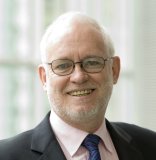 Professor David Begg, Pro Rector Research, gave a presentation entitled: “HE Funding Landscape and the Next Public Spending Review”.
Professor David Begg, Pro Rector Research, gave a presentation entitled: “HE Funding Landscape and the Next Public Spending Review”.
What do we know about what is happening to funding?
David’s presentation considered how the funding landscape is evolving and what consequences there might be for the College’s research strategy. Key points were:
- Funding from Research Councils is due to fall by 10% by 2015 (see this slide for the figures and breakdown by each research council).
- There will be a tendency to concentrate on excellence with universities competing for a bigger share of a smaller cake.
- The steer from Research Councils UK is that that they are keen to promote facilities sharing, funding longer, larger grants to teams of researchers, with fewer individual grants issued.
The College will need to consider how these changes will affect its research activities and its approach to managing its relationships with the Research Councils.
In further discussion about research funding, with contributions from across the faculties presented by Professor Jonathan Weber, Professor Donal Bradley and Professor Ross Ethier, a number of suggestions and comments were made:
Prioritising research: The priority areas for research councils going forward are high value manufacturing, healthcare, digital, low carbon and energy. The College should consider how to develop research in these areas and whether a more collaborative approach across the faculties may yield benefits. Where research is no longer competitive, departments should be proactively considering other areas to focus on.
Research stars: Greater funding will go towards academic stars in their field, which will create a more competitive market. Such stars have bargaining power, being highly mobile and much sought after. The College should consider how and when to target its recruitment activities, as well as how to develop and retain its home-grown stars.
Academic partnerships: There could be a more strategic approach to the College’s involvement in academic partnerships, and an institutional framework may help with collaborations with other London universities. More consideration might be given to how Imperial can influence the research councils and how the College is represented among the decision makers.
International collaborations: When talking about the funding landscape and research strategy, the environment outside the UK is healthier. It was noted that for international collaborations to succeed, foundations should be in place to build upon, such as the College’s links in Singapore which led to the establishment of the new medical school there.
Opportunities in Europe: The College should remember the European Research Council (ERC) as a funding source.
- Imperial did well in first the tranche of funding from the ERC and should consider how to build on this success in future rounds.
- There is interest from the European Parliament for Imperial to take part in discussions on the 8th Framework Programme proposals. Imperial’s involvement at an early stage could deliver benefits to the College.
- Individuals who have knowledge of the inner workings of EU parliament and policy should share this more widely across the College so lessons can be learnt from previous experiences.
Corporate partnerships: Additional resource to support analysis is needed to ensure the College benefits from greater involvement with corporations. For example, there is a trend among private companies for in-house research and development functions to be disbanded so universities which take a multidisciplinary approach should be exploring the opportunities this change presents. Academic champions could be appointed to interface with key corporate partners and the College could consider secondments out of departments and into the faculty structure to support relationship building.
Technology Innovation Centres (TICs): The College should prioritise its involvement in government-funded TICs, which aim to bridge the gap between academic discovery and commercial exploitation, in areas it is already active in, which include the digital economy and plastic electronics. (A recent report on Technology and Innovation Centres by the House of Commons Science and Technology Committee is available at: http://www.publications.parliament.uk/pa/cm201011/cmselect/cmsctech/619/619.pdf).
Supporting researchers: Researchers should be offered more robust preparation for panel interviews, more opportunities for internal grant reviews and the possibility of hiring professional writers to assist with applications. The College needs to empower individuals and provide them with encouragement, support and recognition.
Quality assurance: To assess the quality of a department’s research activities, Heads of Department could invite visiting committees including members from outside the College, for example academic staff at other leading universities, to conduct a departmental review at the end of their term of office.
Focus on excellence: Academic excellence should be at the core of Imperial’s work with the Research Councils, above any reliance on marketing and presentation. Excellence is built on the quality of people and our focus should be on suporting them and their teams.
Conclusion
The Rector noted that there are common issues to be addressed across the faculties. These include offering appropriate career development opportunities, and bringing in research stars. There were clear messages on the need for partnerships to be strategically aligned and better understood, and whether the College has enough representation with funders and groups.